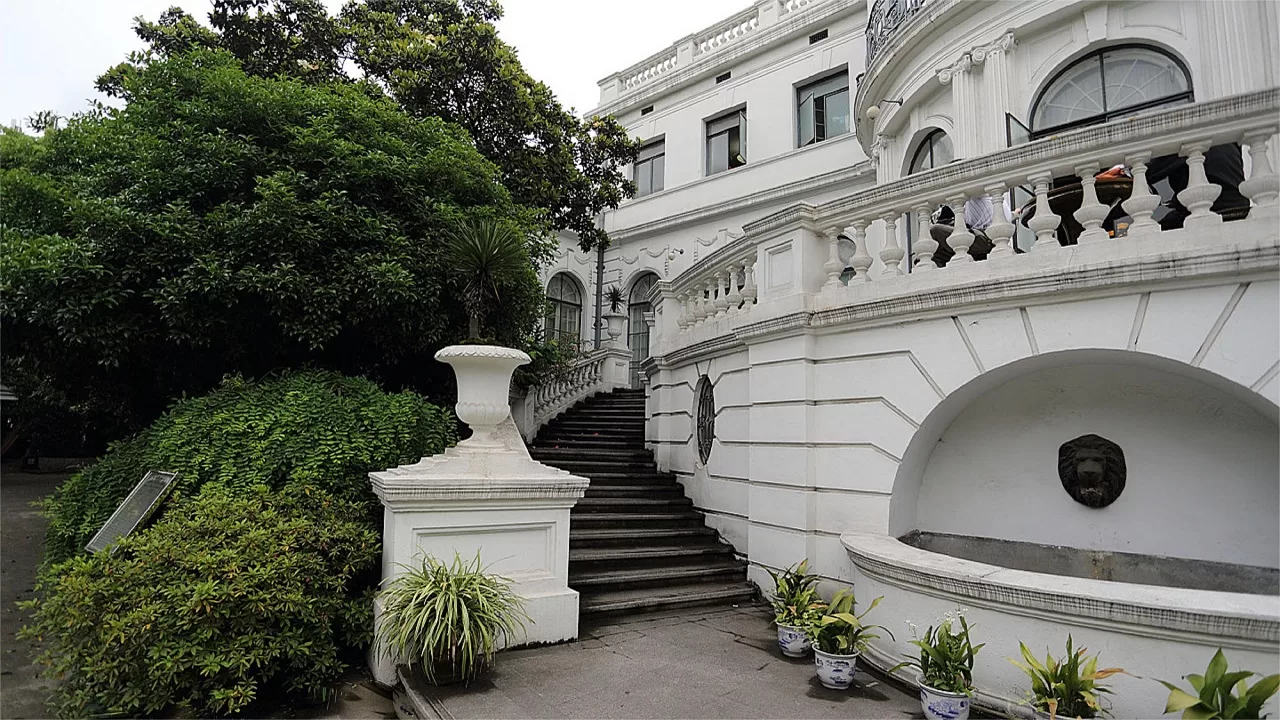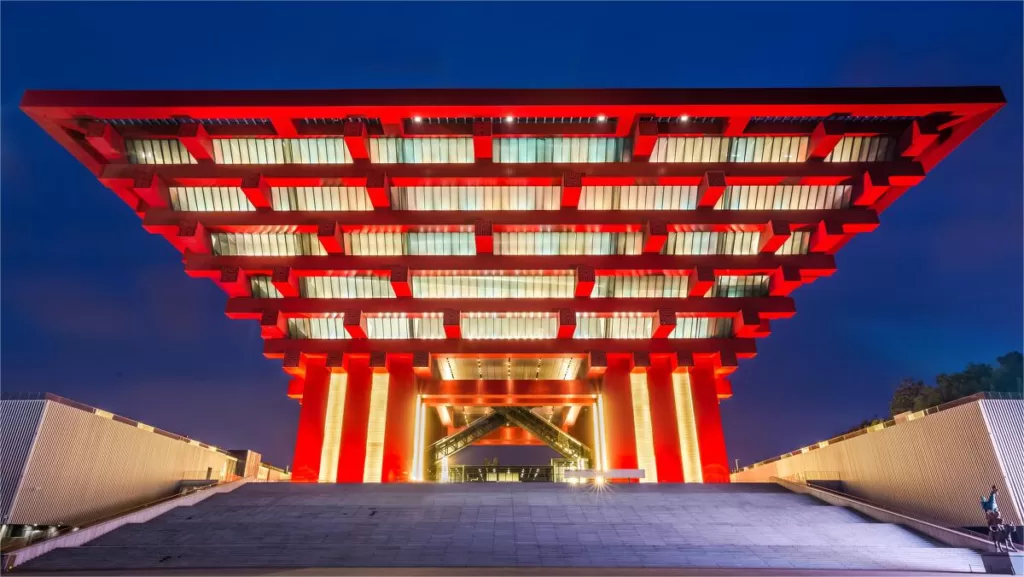The Shanghai Museum of Arts and Crafts (上海工艺美术博物馆) is situated in a garden building on Fenyang Road, showcasing a variety of exquisitely crafted sculptures, embroideries, and folk crafts such as traditional lanterns. The museum itself is an artistic Renaissance-style structure often referred to as the “Little White House” due to its resemblance to the White House in the United States. The museum is divided into three floors: the first floor houses the Folk Crafts Hall and a marketplace, the second floor is dedicated to sculptures, and the third floor focuses on weaving and embroidery.
Visitors will notice the nostalgic atmosphere in the elegantly decorated building. Constructed in 1905, the structure served as the official residence of the Chief Executive Officer of the former French Concession Municipal Council. Many distinctive features of the original building are still preserved, including the third-floor bathroom with contemporary amenities like a three-dimensional shower unit and colored inlaid glass windows. The vintage spiral staircase connecting the second and third floors also adds a retro touch, providing an excellent backdrop for photography enthusiasts.
Table of Contents
- Basic Information
- Location and Transportation
- Highlights of Shanghai Museum of Arts and Crafts
- Useful Tips Summarized from Reviews
- Attractions near the Museum
- Other Art Museums in Shanghai
Basic Information
| Estimated Length of Tour | 1 – 2 hours |
| Ticket Price | 8 RMB |
| Opening Hours | Morning: 9.00 – 11.30; Last admission: 11.00 Afternoon: 13.00 – 16.00; Last admission: 15.30 Closed on Mondays |
| Telephone Number | 0086-021-64741383 |
Location and Transportation
The Shanghai Museum of Arts and Crafts is nestled within the vibrant Xuhui District, which is known for its cultural landmarks, shopping districts, and historical sites. Its exact address is No. 79 Fenyang Road, Xuhui District, Shanghai. To get there, you can choose the following ways:
Bus: Take bus 42 or 45 and get off at Taiyuan Road Fenyang Road Stop (太原路汾阳路),
Metro: The nearest metro station to the Shanghai Museum of Arts and Crafts is Changshu Road (常熟路) on line 1 and line 7. After getting out of the station from exit 2, walk about 600 meters to the south to reach the museum.
Highlights of Shanghai Museum of Arts and Crafts
Diverse Art Forms

The Shanghai Museum of Arts and Crafts showcases a diverse range of traditional Chinese art forms. Visitors can marvel at the intricately painted ceramics, delicate silk tapestries, exquisite wood carvings, and lustrous jade carvings. The museum also presents stunning examples of metalwork, lacquerware, calligraphy, and embroidery. Each art form represents a distinct aspect of China’s rich cultural heritage, displaying the mastery and creativity of generations past. With its comprehensive collection, the museum offers a captivating glimpse into the multifaceted world of Chinese arts and crafts, providing a deeper understanding and appreciation of the country’s artistic traditions.
Silk Embroidery

Silk embroidery takes center stage at the Shanghai Museum of Arts and Crafts, showcasing the exquisite beauty and intricate craftsmanship of this traditional Chinese art form. The museum displays a captivating collection of silk embroidered artworks, featuring delicate threads meticulously stitched onto silk fabric to create stunning designs. Visitors can admire the intricate details, vibrant colors, and skillful techniques employed by master embroiderers. From intricate landscapes to intricate floral motifs, the silk embroidery exhibits at the museum offer a glimpse into the rich cultural heritage and artistic expression embedded within this time-honored craft, captivating the senses with their beauty and cultural significance.
Traditional Crafts Demonstrations

At the Shanghai Museum of Arts and Crafts, visitors have the unique opportunity to witness traditional crafts demonstrations. Skilled artisans bring ancient techniques to life, showcasing the intricate processes behind traditional crafts such as porcelain painting, silk weaving, wood carving, and more. Through live demonstrations, visitors can witness the mastery of these craftsmen firsthand, gaining insights into the meticulous attention to detail and the cultural significance of each craft. These demonstrations provide a deeper appreciation for the artistry and skill involved in traditional crafts, allowing visitors to connect with the rich heritage and traditions of Chinese craftsmanship in a tangible and immersive way.
Jade Carvings

The Shanghai Arts and Crafts Museum houses a captivating collection of jade carvings, a testament to the exquisite craftsmanship and artistic prowess of Chinese artisans. These remarkable jade sculptures, ranging from delicate figurines to intricate ornaments, showcase the timeless beauty and cultural significance of this revered gemstone. Each carving reflects meticulous attention to detail, harmonious designs, and a deep appreciation for natural aesthetics. Visitors are captivated by the mesmerizing play of light and color on the translucent jade surfaces, as well as the rich symbolism embedded within each piece.
Useful Tips Summarized from Reviews
Ground Floor Exhibition and Artisan Market: Upon entering, you’ll find the ground floor dedicated to exhibiting folk crafts and hosting a small marketplace for artistic goods.
Second Floor Exhibition: Currently, the second floor features various works of ivory, jade, wood carvings, as well as some gold, silver, and enamel pieces.
Third Floor Embroidery Hall and Traditional Craft Studios: The third floor houses the Embroidery Hall, where you can admire exhibits related to embroidery and other intangible cultural heritage. Additionally, it serves as a traditional craft studio where visitors can witness artisans at work.
Interior Decor and Atmosphere: Apart from the exhibits, take some time to appreciate the interior decor of the museum. The ambiance and design elements may transport you to a different era, evoking a sense of stepping into a bygone era or even another country.
Photography Opportunities: The museum provides ample opportunities for photography, especially the spiral staircase connecting the second and third floors. Capture the essence of the French Renaissance period as you ascend or descend the staircase, reminiscent of a journey through time.










The whole museum has three levels. Going up to the second floor terrace through the spiral stairs on both sides outside, you can directly enter the carving gallery with the most abundant collection. You can see very exquisite ivory carvings and jade carvings, very delicate and exquisite, which is amazing. I was amazed from the beginning to the end. Apart from a small number of collections, there are also more than ten art studios set up on the third floor… Read more »